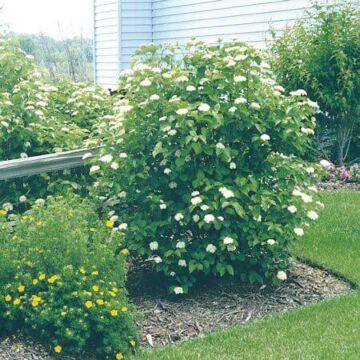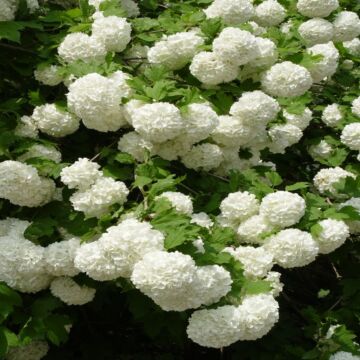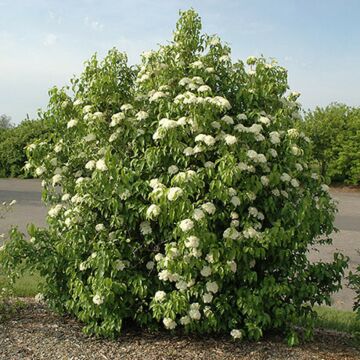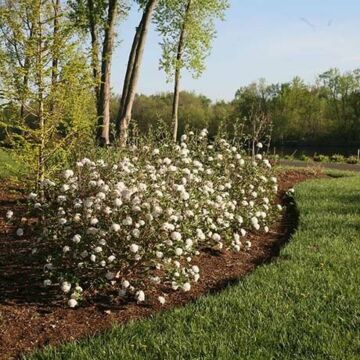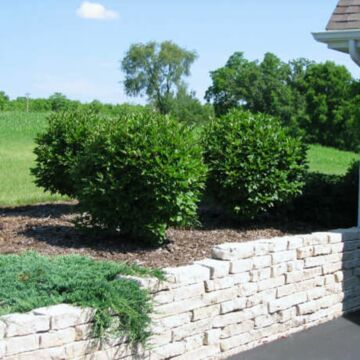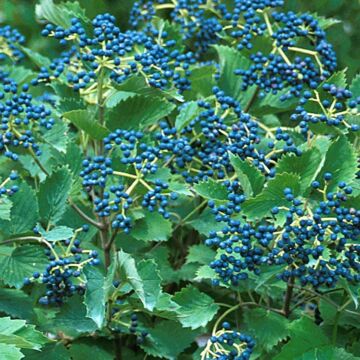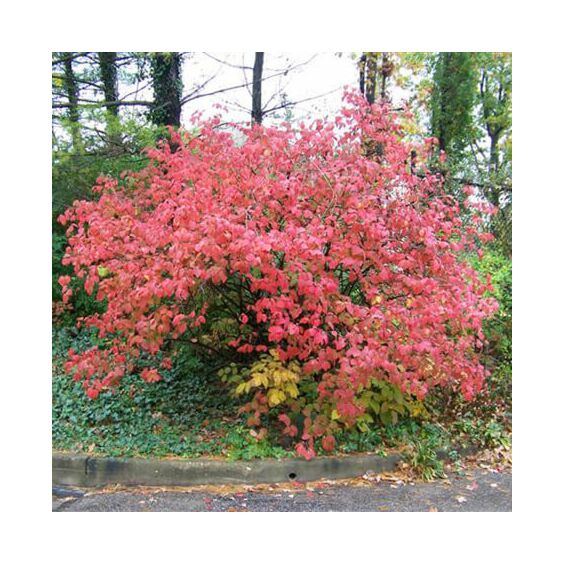
Growing zones
See Zone Map >Status: In stock
At McKay Nursery, we are dedicated to providing robust and beautiful plants like the Korean Spice Viburnum (Viburnum carlesii) shrub, ensuring they are a perfect addition to your landscape. With over a century of expertise, we guarantee the health and vitality of all our plants, backed by superior customer support. For further assistance or to make a purchase, contact us at [email protected] or call 920-478-2121. Our team is ready to help you elevate your gardening experience with quality and care.
Please note: #5 containers cannot be shipped to Arizona, California, Idaho, Montana, Nevada, Oregon, Utah, Washington due to size restrictions.
- Sun, Part Sun/Shade
Mature Plant Size (H x W): 4-6' x 4-6'
Bloom Season: Spring
- Attracts Bees
- Stone Mulch
- Walnut Toxicity Resistant
- Attracts Butterflies
- Cut Flower
- Fragrant Flowers
- Attracts Pollinators
Planting & Care for Deciduous Shrub – Korean Spice Viburnum
Preparation
- Prune in April and July. Trim shoots lightly in early spring.
- Plant in March, and from May through November.
- Korean Spice Viburnum needs at least half a day’s full sunshine to flourish.
Shield large-flowering varieties from cold wind. - These shrubs prefer well-drained soil enriched with well-rotted organic matter several weeks before planting.
- In light soils that parch quickly, mulch in spring with moisture-conserving, bulky organics to keep roots cool and active.
Opening Plant Material
- Containers: Completely saturate all container plants by putting them in a larger water container until bubbling stops. Remove the plant, then dig a hole no deeper than the depth of the container, ensuring it’s wider on the sides by an additional 6” or more.
Planting Containers
- Plant in March, and from May through November.
- Slide the plant from the pot by tapping on the bottom of the pot.
- With a shovel or knife, trim the bottom 2" off of the root ball for plants in plastic containers.
- Rotate the plant to the proper position. Never lift or move plants by the tops.
Place the root ball in the hole. - Notice where the base of the trunk flares out from the tree. This is called the root flare. This root flare should show when the tree is planted. If necessary, add soil under the ball so the root flare is exposed.
- Place fertilizer packets into the bottom of the hole (if purchased). *Use Our Recommended Fertilizer.
- Backfill the hole with soil, making sure the top of the root ball is visible and slightly higher than the soil around it.
- Firm the soil around the plant. Water well to settle soil around the root ball.
Pruning - After Planting
- Containers: Although it’s not essential after planting, light pruning can help shape a Korean Spice Viburnum. Doing so removes any broken branches from shipping or thins out a heavily branched plant to assist in the transplanting process and the appearance of your new planting.
Pruning - Through-out the Season
- Prune in April and July. Trim shoots lightly in early spring.
Watering - After Planting
- Plants typically take approximately 6 weeks to establish new roots in your soil. During this period, water plants as often as every 2-4 days at the start and at least a minimum of once per week.
- Beyond the six-week establishment period, water once per week unless rain occurs.
- Remember to check soil moisture by sticking your finger into the soil around 3”.
Watering - Through-out the Season
- After the first season, plants should only be watered during extended periods without rain.
- How do you know if your plants need water? The easiest way to tell is to touch the soil around the roots. If it is moist, there is no need to water. If it’s dry, give it a good soak with the hose end (no nozzle), watering the soil only, not the leaves.
- Same as after planting, stick your finger into the soil around 3” to check soil moisture.
Frequently Asked Questions
What type of sun exposure is ideal for Korean Spice bush?
Are Korean Spice Viburnum (Viburnum carlesii) shrubs invasive?
Why is my Korean Spice Viburnum (Viburnum carlesii) shrub’s leaves drying up?
Korean spice viburnum is only drought-tolerant to a certain extent. Beyond that point, the shrub will show signs of distress, such as dried-up and blackened leaves.
Homeowners often let ground covers and garden plants get quite thirsty, believing they will readily go dormant and quickly recover once it rains again. It's best to water your viburnum deeply and immediately when you notice the leaves starting to dry up and turn black.
What are the common problems when growing Korean Spice Viburnum (Viburnum carlesii)?
How do I protect my Korean Spice bush during winter?
Planting & Handling Help
Download our Planting and Handling Guide below to plan for a successful arrival and install of your plants. Be sure to water all plants as soon as they arrive and every day until you’re ready to plant. Keep any bare root bundles in a shady, cool spot with the roots covered at all times.


Learn More
Watch our videos on handling bare root plants, how your order is prepared for shipment and more.
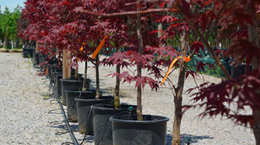

Plant Sizing
What is the difference between Containers, Grow Bags, Bare Root, and Balled & Burlap (B&B)?
Shipping Times
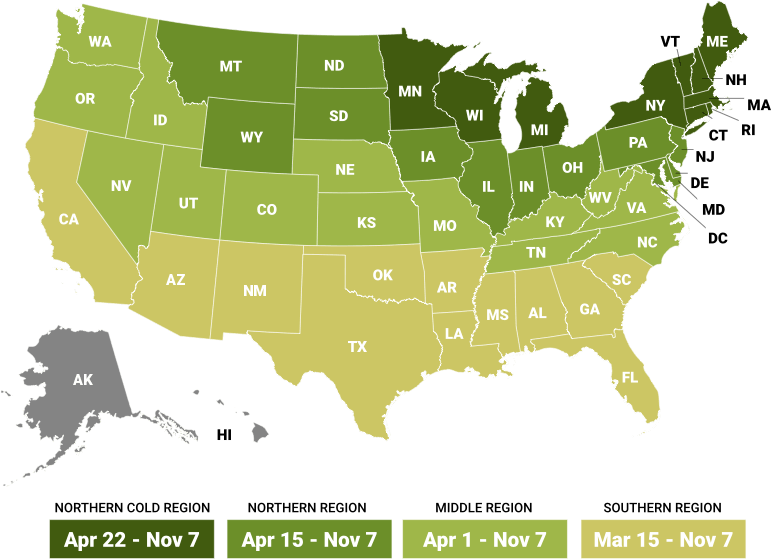

Our FedEx and local shipping times depend on two factors, one is by the region and the second is the type of product being shipped. For example, small fruits are only shipped in spring, but majority of our perennials are shipped from spring until fall. Keep in mind the dates below act as a general guide. Due to unpredictable weather, staffing, inventory and industry demands these timelines can change. Therefore, we cannot guarantee any of these times.
Shipping Dates by Region*
Northern Cold Region: April 22nd - November 7th
Northern Region: April 15th - November 7th
Middle Region: April 1st - November 7th
Southern Region: March 15th - November 7th
Local Delivery (small radius from Waterloo, WI): April 22nd - November 7th
Shipping Dates by Season*
Spring Shipping: Region Start Date (above) - May
Fall Shipping: September - November
Due to unpredictable weather, these times may vary. Some varieties are exceptions due to heat and plant health reasons. Enter your shipping zip code at the top of this page and be sure to check the shipping information on each product before you add it to your cart. If the product is too large or restricted in your state, you will not be able to checkout with that item in your cart.

